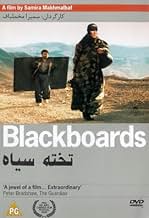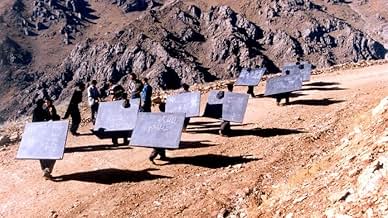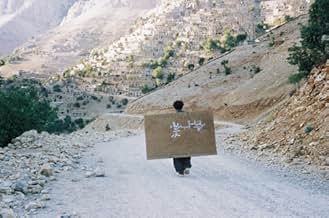VALUTAZIONE IMDb
6,8/10
2995
LA TUA VALUTAZIONE
Aggiungi una trama nella tua linguaKurdish teachers Said and Reeboir roam Iranian villages near Iraqi border during war. Said guides displaced men, marries widow Halaleh. Reeboir joins child smugglers. Amid danger, they try t... Leggi tuttoKurdish teachers Said and Reeboir roam Iranian villages near Iraqi border during war. Said guides displaced men, marries widow Halaleh. Reeboir joins child smugglers. Amid danger, they try teaching nomadic students while soldiers patrol.Kurdish teachers Said and Reeboir roam Iranian villages near Iraqi border during war. Said guides displaced men, marries widow Halaleh. Reeboir joins child smugglers. Amid danger, they try teaching nomadic students while soldiers patrol.
- Regia
- Sceneggiatura
- Star
- Premi
- 3 vittorie e 3 candidature totali
Recensioni in evidenza
This film is flawed in any number of ways - stories are unresolved; scenes of military oppression are unconvincing; and more generally I was left with a somewhat unmoved feeling when the lights came up. I thought "The apple" was a fantastic film in its challenging combination of documentary and fiction, but perhaps that an over-simplicity in "Blackboard"'s storyline was exposed by the same honest, basic direction and storytelling that made Ms Makhmalbaf's previous film really powerful.
There are definitely many positive aspects to this film as well. It fearlessly deals with one group of people (nomads who I think are Kurdish) people who really are vulnerable and at the mercy of powerful and highly suspect governments on both sides of the border. It shows that these people have a cultural strength that seems to transcend their harsh circumstances. In its other story strand it shows movingly how children, even more vulnerable, are exploited by a deregulated commercial system. Beetle-browed, bowed beneath heavy loads in the hot sun, self-defensively referring to themselves as 'mules', the kids are old before their time.
The film also has a (more or less) powerful sense of transcendental storytelling to it. The nomads are all oppressed people, looking for a promised land. The children are mythical also: the kid's story about the rabbit has an air of antiquity about it.
Neither group of oppressed people has time for the education that the main characters offer. They are too busy surviving. The use of non-actors in the film is a strength and a weakness. In a story that is more obviously fictional than "the Apple", some performances are a little wooden. But I think the emotional punch of realism, the feeling that we may in effect be watching something that is happening today somewhere in the world, more than makes up for this formal, actorly problem.
Hurriedly, then: a flawed diamond in the dust.
There are definitely many positive aspects to this film as well. It fearlessly deals with one group of people (nomads who I think are Kurdish) people who really are vulnerable and at the mercy of powerful and highly suspect governments on both sides of the border. It shows that these people have a cultural strength that seems to transcend their harsh circumstances. In its other story strand it shows movingly how children, even more vulnerable, are exploited by a deregulated commercial system. Beetle-browed, bowed beneath heavy loads in the hot sun, self-defensively referring to themselves as 'mules', the kids are old before their time.
The film also has a (more or less) powerful sense of transcendental storytelling to it. The nomads are all oppressed people, looking for a promised land. The children are mythical also: the kid's story about the rabbit has an air of antiquity about it.
Neither group of oppressed people has time for the education that the main characters offer. They are too busy surviving. The use of non-actors in the film is a strength and a weakness. In a story that is more obviously fictional than "the Apple", some performances are a little wooden. But I think the emotional punch of realism, the feeling that we may in effect be watching something that is happening today somewhere in the world, more than makes up for this formal, actorly problem.
Hurriedly, then: a flawed diamond in the dust.
Blackboards is a very good film: well acted and engaging. The story is fresh: a group of Iranian teachers with blackboards on their backs, trying to each undereducated Kurdish refugees how to read, write, count, et cetera.
The film is filled with endearing characters: a sharp young boy working as a mule, a teacher desperately trying to teach those around him, an old man with urinary problems, a woman whose chaotic life has been extremely painful and just wants to be able to hold on to her son. Samira Makhmalbaf has revealed herself as a humane filmmaker with a good eye for drama in everyday life. The film is honest in its vision of a world where reading and writing seem so useless, where the only thing that matters is the ability to keep on moving. That is what makes the teachers' attempts to teach the many refugees so pathetic. I feel that a good filmmaker like Makhmalbaf, someone who has a story to tell and knows how to tell it, is better than the dozens of pretensions auteur filmmakers with their overblown visions and obnoxiously pointless powerhouse melodrama.
The film is filled with endearing characters: a sharp young boy working as a mule, a teacher desperately trying to teach those around him, an old man with urinary problems, a woman whose chaotic life has been extremely painful and just wants to be able to hold on to her son. Samira Makhmalbaf has revealed herself as a humane filmmaker with a good eye for drama in everyday life. The film is honest in its vision of a world where reading and writing seem so useless, where the only thing that matters is the ability to keep on moving. That is what makes the teachers' attempts to teach the many refugees so pathetic. I feel that a good filmmaker like Makhmalbaf, someone who has a story to tell and knows how to tell it, is better than the dozens of pretensions auteur filmmakers with their overblown visions and obnoxiously pointless powerhouse melodrama.
I understand the vigorous debate Samira Makhmalbaf's BLACKBOARDS, has generated, but I'd also say that I loved this very demanding but often moving film - a remarkable achievement for a very young, but already accomplished filmmaker. Watching her career develop will be quite a treat.
Shot with hand-held cameras and featuring a Kurdish cast of non-actors, BLACKBOARDS is very slowly paced, with a rambling quality that captures the aimless down time of everyday life. However the restless camera work also fills the film with an unceasing tension, gradually revealing the desperation filling the stateless existances of the many nervous characters.
The politics of the region are an ever-present backdrop to the story, and unfortunate political machinations render both education and basic survival an arduous complexity - to live and to gain even the most basic of educations are made into luxuries, which - even in desolate and strife-torn landscapes - some are willing to die for.
A handful of moments stood out for me: the scenes set in the river camp showcase the warmest of human interactions, and the final scene is remarkably beautiful.
This very rigorous film (superficially reminding me of both Abbas Kiarostami and Tsai Ming-liang) nonetheless had me hooked.
Shot with hand-held cameras and featuring a Kurdish cast of non-actors, BLACKBOARDS is very slowly paced, with a rambling quality that captures the aimless down time of everyday life. However the restless camera work also fills the film with an unceasing tension, gradually revealing the desperation filling the stateless existances of the many nervous characters.
The politics of the region are an ever-present backdrop to the story, and unfortunate political machinations render both education and basic survival an arduous complexity - to live and to gain even the most basic of educations are made into luxuries, which - even in desolate and strife-torn landscapes - some are willing to die for.
A handful of moments stood out for me: the scenes set in the river camp showcase the warmest of human interactions, and the final scene is remarkably beautiful.
This very rigorous film (superficially reminding me of both Abbas Kiarostami and Tsai Ming-liang) nonetheless had me hooked.
10Red-125
This wonderful movie (shown here as "Blackboards") demonstrates the power of cinema to communicate circumstances and situations that are totally alien to those of us watching in comfort during a U.S. film festival.
The Director/Screenwriter, Samira Makhmalbaf, literally learned her trade at her father's elbow. He taught her well. Makhmalbaf was only twenty years old when she made this movie, but she has already acquired the skilled director's eye for filmmaking.
The locale in which the film is set is totally alien to me. The mountains of Iran offer stones and more stones. I believe this is the first picture I have ever seen where there is not a single image of a tree or even a green plant. The mountains are made of rocks, and the homes are made of rocks, and most of the characters in the the films spend their time climbing up, down, and between the rocks.
In this incredibly harsh, barren, non-nurturing environment, two young teachers carry blackboards on their backs and try to find someone--anyone--who wants to learn to read and write, and who can pay for this instruction.
Obviously, the teachers are motivated by their basic needs for food, water, and shelter, but--like all good teachers-- they are also motivated by the desire to teach.
Each teacher attaches himself to a group of people moving across a border. (I was never sure which border this was--I think it was from Iran to Iraq.)
Each group has endured hardship and tragedy, and their journeys are filled with the threat of danger. Despite this, the teachers continue their attempts to teach.
This movie was not only powerful, but it was informative. Anyone who thinks the mountains of Iran are more or less like the mountain meadows Julie Andrews encountered when she sang "The hills are alive with the sound of music," needs to see "Blackboards." Despite this hardship, human beings survive, and their desire to learn and to teach survives as well.
An amazing film--not to be missed!
THIS FILM WAS SEEN AT THE LITTLE THEATRE, DURING THE HIGH FALLS (ROCHESTER, NY) FILM FESTIVAL. THIS FESTIVAL IS NOT LARGE, BUT THE QUALITY OF FILMS IS OUTSTANDING. WOULD BE WORTH A SPECIAL TRIP IN 2003!
The Director/Screenwriter, Samira Makhmalbaf, literally learned her trade at her father's elbow. He taught her well. Makhmalbaf was only twenty years old when she made this movie, but she has already acquired the skilled director's eye for filmmaking.
The locale in which the film is set is totally alien to me. The mountains of Iran offer stones and more stones. I believe this is the first picture I have ever seen where there is not a single image of a tree or even a green plant. The mountains are made of rocks, and the homes are made of rocks, and most of the characters in the the films spend their time climbing up, down, and between the rocks.
In this incredibly harsh, barren, non-nurturing environment, two young teachers carry blackboards on their backs and try to find someone--anyone--who wants to learn to read and write, and who can pay for this instruction.
Obviously, the teachers are motivated by their basic needs for food, water, and shelter, but--like all good teachers-- they are also motivated by the desire to teach.
Each teacher attaches himself to a group of people moving across a border. (I was never sure which border this was--I think it was from Iran to Iraq.)
Each group has endured hardship and tragedy, and their journeys are filled with the threat of danger. Despite this, the teachers continue their attempts to teach.
This movie was not only powerful, but it was informative. Anyone who thinks the mountains of Iran are more or less like the mountain meadows Julie Andrews encountered when she sang "The hills are alive with the sound of music," needs to see "Blackboards." Despite this hardship, human beings survive, and their desire to learn and to teach survives as well.
An amazing film--not to be missed!
THIS FILM WAS SEEN AT THE LITTLE THEATRE, DURING THE HIGH FALLS (ROCHESTER, NY) FILM FESTIVAL. THIS FESTIVAL IS NOT LARGE, BUT THE QUALITY OF FILMS IS OUTSTANDING. WOULD BE WORTH A SPECIAL TRIP IN 2003!
It must hard to talk about ignorance, poverty and war without being realistic. I reckon that, most of everything, this film is "realistic". It is undeniable that the settings, the characters and the issues belong to the director's background. She's been able to give "a hint of poetry" thanks to several touching and clever shots (For instance: A family that finds protection under a blackboard). I'm afraid that this film looses part of its potential because of its hybrid nature. It's not a drama, but it's not a documentary either. There are few stories crossing each other, but it is not complex enough to consider it a "Magnolia-style" thing. Finally (and this is what the film seems to be about), there's a teacher who dreams to heal his country with education but ends up facing the bitterness of a failed relationship. Nevertheless I truly appreciated the very last scene, that is worth 2 points in my final vote.
Iacopo Destefani
Iacopo Destefani
Lo sapevi?
- ConnessioniFeatured in Samira cheghoneh 'Takhté siah' rol sakht (2000)
I più visti
Accedi per valutare e creare un elenco di titoli salvati per ottenere consigli personalizzati
- How long is Blackboards?Powered by Alexa
Dettagli
Botteghino
- Lordo Stati Uniti e Canada
- 23.520 USD
- Fine settimana di apertura Stati Uniti e Canada
- 3416 USD
- 8 dic 2002
- Lordo in tutto il mondo
- 41.772 USD
Contribuisci a questa pagina
Suggerisci una modifica o aggiungi i contenuti mancanti





















